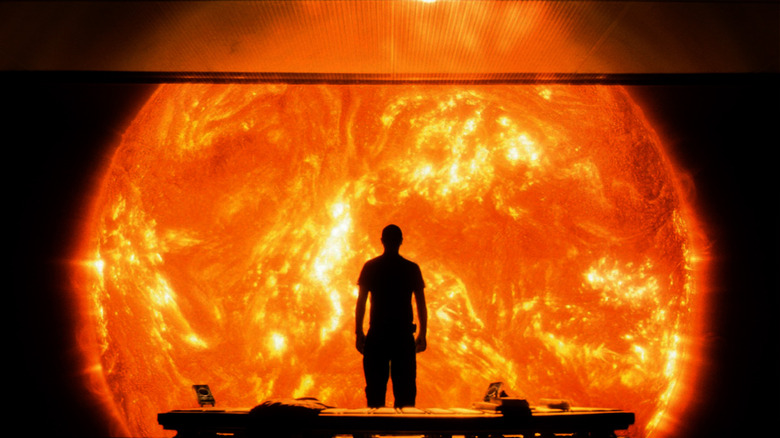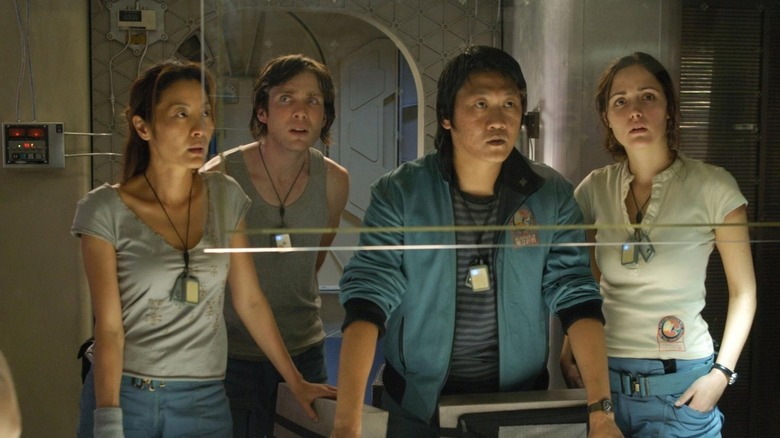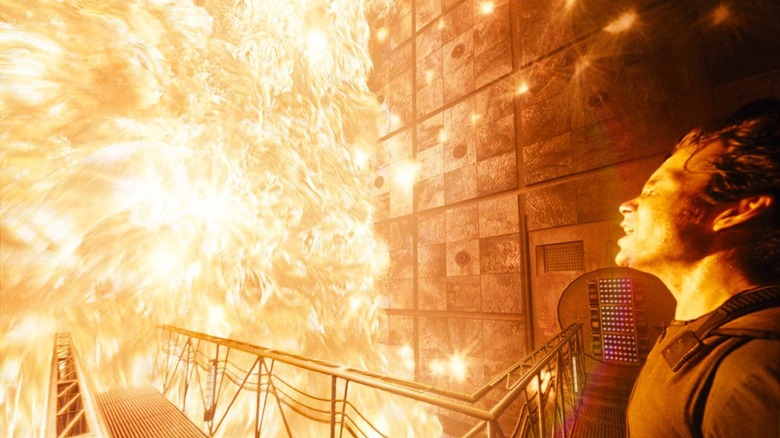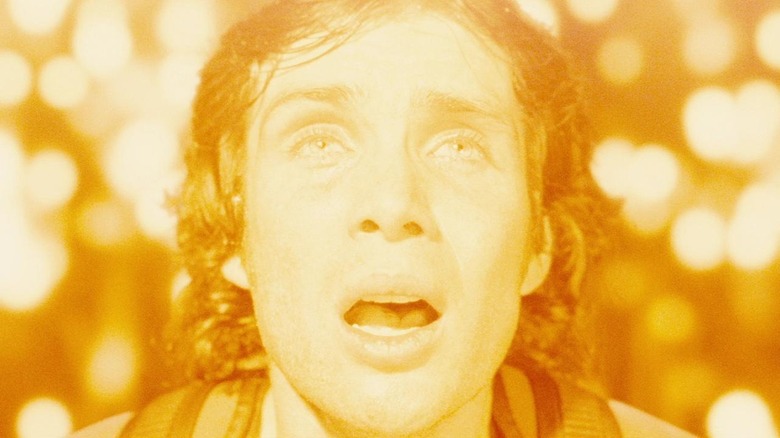Before Oppenheimer, Cillian Murphy Faced Another Apocalypse With Sunshine
Christopher Nolan's "Oppenheimer" is set to be one of the biggest (non-"Barbie") films of the summer, a grand historical drama with a vast A-List cast and intense exploration of one of humanity's greatest errors. It's a chance for Nolan, a filmmaker never short of ambition, to stretch himself even further as a storyteller, but it's also a rare opportunity for its title star to take on a leading role. Cillian Murphy is a Nolan ensemble staple, having played the Scarecrow in the "Dark Knight" trilogy and made appearances in "Inception" and "Dunkirk."
The Irish actor and "Peaky Blinders" favorite has long been an underrated presence on screens big and small, having spent well over two decades establishing himself as a striking character actor and reliable talent. He's made horror films with Wes Craven, fought zombies in "28 Days Later," romanced Scarlett Johansson in "The Girl With a Pearl Earring" and told stories of the Irish War of Independence in Ken Loach's "The Wind That Shakes the Barley." He's done it all. He's even dealt with the peril of an atomic weapon and the threat of mass extinction on Earth in a movie before! Thanks to Danny Boyle and "Sunshine", Murphy is familiar with this quandary.
Sunshine is an apocalyptic horror sci-fi
In between his zombie horror "28 Days Later" and the Oscar-winning drama "Slumdog Millionaire," Danny Boyle aimed for the stars. Screenwriter Alex Garland, with whom Boyle had worked on his messy adaptation of "The Beach," took inspiration from the likes of "2001: A Space Odyssey," Ridley Scott's "Alien" and the Russian classic "Solaris" for his jaunt towards the center of our solar system. In "Sunshine," it is the sun itself that is dying. With it, so will all life on Earth perish as the planet's temperature drops beyond the means of human habitation. Eight astronauts from around the world have been tasked with flying towards the sun on the spaceship Icarus II and planting a bomb on it that they hope will reignite its solar fury. As many a sci-fi horror featuring people in enclosed spaces floating through the vast nothingness can attest, it doesn't take long for things to go wrong.
"Sunshine" has an enviable good cast, the kind of ensemble of character actors and future leading icons that would put most films to shame. Alongside Murphy, who plays the lead physicist Robert Capa, are a pre-Captain America Chris Evans, Rose Byrne, Michelle Yeoh, Cliff Curtis from "Fear the Walking Dead," and Benedict Wong of "Doctor Strange" fame. To have the cast form a tight bond, Boyle had this ensemble live together for several months and undergo space training and scuba diving. He also took them on a tour of a nuclear submarine to give them a sense of the claustrophobic living conditions of real astronauts, and even sent them up on a zero-G plane to experience weightlessness. Murphy worked with physicist Brian Cox (not that one) so that he could fully understand the awesome scale of the bomb required to make the sun work once more. He found the experience of making "Sunshine" so revealing that it made him an atheist!
Why Sunshine is so terrifying
Many scientists grumbled over the inaccuracies of "Sunshine," from slow-motion movement during weightlessness to whether or not a bomb really could reignite the sun. For Alex Garland, such details were beside the point, although both he and Boyle did hire a number of advisors to shape the science of the film into something believable. The real power of "Sunshine" is in its portrayal of isolation among its astronauts. The crew of Icarus II are shaken, both by the magnitude of their mission and the sheer psychological terror of being stuck in space for an extended period of time. As a viewer, you feel entrapped in the space this ensemble shares, made all the more stifling by Boyle's refusal to cut back to scenes on Earth that are common in this genre. Everything is designed to make you feel trapped, including the space suits that have a post-box-sized slit to see through rather than a full-face visor (the suit was nicknamed Kenny after the character from "South Park" because of this choice.)
The other recurring theme is an age-old one: science versus faith. The mission of Icarus II is stridently atheistic, one of pure logic designed to do for humanity what nobody else can or will do. They are following in the footsteps of Icarus I, which went missing seven years prior while trying to deliver its own bomb to Earth. When the crew discover this lost ship, they find its crew charred to death save one astronaut, Pinbacker (Mark Strong playing, of course, a villain). After years of loneliness and untreated first-degree facial burns, Pinbacker has gone mad and tries to sabotage the Icarus II mission, claiming that God (meaning the sun) has told him to send all of humanity to Heaven. This third-act frenzy makes "Sunshine" a more traditional horror film than its preceding parts, and it does become less satisfying as a result (although there is a moment where Pinbacker has the skin pulled from his arm that is truly horrifying).
Sunshine is more relevant than ever
Despite positive reviews, "Sunshine" didn't inspire audiences, and only grossed around $32 million from a modest $40 million budget. Reviews generally agreed that the third act was weak and let down the rest of the film's more metaphysical approach to the sci-fi horror genre. It didn't hurt anyone's careers, least of all Cillian Murphy, who went on to a strong career in film and TV that has culminated in his acclaimed role in "Oppenheimer." It's a movie that makes excellent use of his unique face and ability to convey a blend of unnerving and empathic (which is perfect for J. Robert Oppenheimer, the man who became Death, the destroyer of worlds.)
Audiences did eventually find their way to "Sunshine." Its philosophical terror remains potent, arguably more so as we experience the disintegrating effects of climate change in real-time. Much like its cinematic predecessors, "2001: A Space Odyssey" and "Solaris," "Sunshine" acutely captures the gargantuan scale of the galaxy and how it cannot help but overwhelm you, the mere human being, trying to be its equal. In the film's first two-thirds, the enormity of the mission is inescapable. If these mere mortals do not succeed, billions of people will die and that is a weight that smothers them, as it would for any of us.
Ultimately, we are but specks that populate a slightly larger speck floating through the vast nothingness of the universe. When we confront that painful reality, especially as non-believers in an omnipotent deity, it's understandably tough to deal with. It can break you. Yet there is also awe here. The astronauts are left dumbfounded by the sight of the sun so up close. It's no wonder that Pinbacker gazes upon it and sees the face of God. We are but debris in the grand scheme of life and "Sunshine" nails that sensation, but it also believes in fighting to survive amongst it all. There is hope amid the desolation, and that's worth saving.



